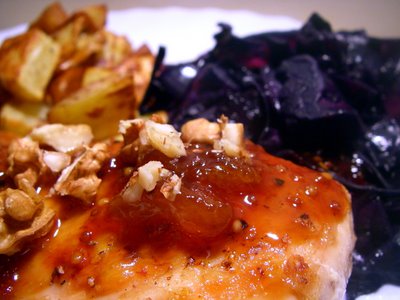But let us remind the skeptics that, while there are undoubtedly myriad reasons not to read our blog, British food isn't all overcooked roasts and limp, soggy veg. In fact, the UK is in the midst of something of a gastronomical revolution and London is commonly considered to be the gourmet city of the moment; and this trend is not limited to the prohibitively expensive, Michelin-rated restaurant. Organic and fair trade items dominate grocery store shelves, and tasty pub food is served everywhere with great aplomb, paired with delicious
 British ales and wines from around the world.
British ales and wines from around the world.(A future posting on the British preference for room temperature beer is in the works ... but we have to do some more research first. Much, much more research.)
Samuel Chamberlain reminds us that we Americans are not in a position to criticize British food, "coming from a country, as we do, where steaks are cooked in a few seconds under infrared rays, where the steam table is the restaurateur's faithful ally and where TV dinners, hot dogs, hamburgers, pickles, soft drinks, and peanut butter sandwiches are among the essentials of life. At least the British don't bake marshmallows on top of sweet potatoes." Now, we love our peanut butter (and have had a devil of a time finding the edible stuff here), but the truth is that modern English cuisine ain't all that bad. Indeed, our own cooking is more and more frequently drawing inspiration from it. (Tam is putting clotted cream on everything he eats.)
The sight, smell and oddly squeaky sound of boiling cabbage have often seemed to exemplify the direst of British culinary offerings. Our friends at Wikipedia note that "boiled cabbage seems to have fallen out of favor in North America, possibly due to the strong smell released during the cooking, to its image as a food of the poor, or to its reputation for promoting flatulence." Certainly you wouldn't want to put such a description on a menu, but while we're not attempting to dedicate this blog to the American revival of previously underappreciated vegetables (despite our comments on the parsnip), we will confess that we ourselves are big fans of red cabbage - although not in its boiled state.
This recipe makes a splendid English fall dinner, and is healthy to boot. If you wanted to be more adventurous, and have just returned in your red blazer and jodhpurs from a shooting expedition in Windsor Park, you could replace the chicken with quail, partridge or other catch of the day.

Apricot Chicken with Red Cabbage
2 teaspoons olive oil
2 skinless, boneless chicken breast halves
1 small onion, sliced
1/2 head red cabbage, outer leaves removed, cored and sliced
1/4 cup white wine
1/4 cup water
1 teaspoon white wine vinegar
1/4 cup apricot preserves (chop up any large apricot pieces)
1 teaspoon soy sauce
1 tablespoon coarse-grained English mustard
juice of 1/2 lemon
1/4 teaspoon crushed red pepper
Chopped toasted walnuts for garnish
Heat 1 teaspoon olive oil in large skillet over medium high heat until hot but not smoking. Add onion; sprinkle with salt and saute until beginning to turn translucent. Add cabbage and sprinkle with salt. Saute for about 5 minutes or until beginning to wilt. Add wine and water. Cover, turn heat down and simmer until cabbage is tender and liquid is absorbed, about 25 minutes.
Meanwhile, heat remaining olive oil in another skillet over medium high heat and season chicken with salt and pepper. Pan-fry chicken until just cooked through, about 4 minutes per side.
In a small saucepan, combine apricot preserves, soy sauce, mustard, lemon juice and red pepper. Stir together and cook over low heat until slightly reduced, about 4 minutes.
Add vinegar to cabbage mixture and season to taste. Pour sauce over chicken and garnish with chopped walnuts. Serve over cabbage.
Serves 2.
Remember, you are what you eat!






2 comments:
mmmm... yum yum! thanks for sharing the recipe :)... just blog hopping here :D
As a person of German heritage, I love sweet and sour red cabbage, but will definitely try your recipe because it sounds yummy. However, needless to say, I'm mostly in awe that you shared with us your discovery of the cabbage converter - after all, how many of us haven't needed just such a doohickey time after time? I certainly plan to make it part of my regular routine...
Post a Comment